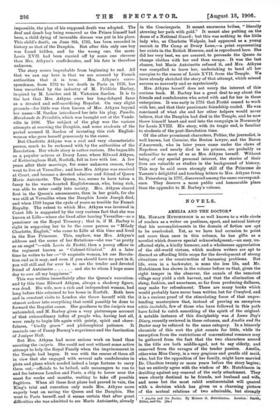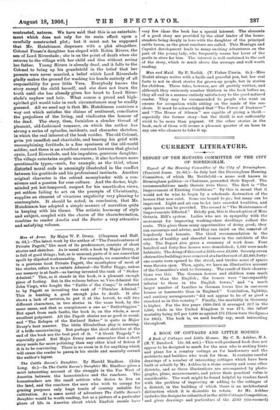NOVELS.
AMELIA AND THE DOCTOR.*
MR. HORACE MITCHINSON is so well known to a wide circle• of readers as a writer on pastimes, sport, and natural history that his accomplishments in the domain of fiction are apt to be overlooked. Yet, as we have had occasion to point out more than once in this column, he has gifts as a novelist which deserve special acknowledgment,—an easy, un- affected style, a kindly humour, and a wholesome appreciation of the old-world virtues, which modern writers are apt to discard as affording little scope for the development of strong situations or the construction of harassing problems. But life, even in a backwater, is none the less life, and Mr. Hutchinson has shown in the volume before us that, given the right temper in the observer, the annals of the remotest village may yield a rich harvest, and that the elimination of slang, fashion, and smartness, so far from producing dullness, may make for refreshment. There are many books which would probably have never been written but for Cranford, and it is a curious proof of the stimulating force of that unpre- tending masterpiece that, instead of proving an exemplum vitiis imitabile, few of those who have followed in this path' have failed to catch something of the spirit of the original. A notable instance of this discipleship was A Lame Dog's Diary, recently reviewed in these columns, and Amelia and the Doctor may be referred to the same category. In a leisurely chronicle of this sort the plot counts for little, while its exemption from the restrictions of conventional romance may be gathered from the fact that the two characters named in the title are both middle-aged, not to say elderly, and removed from the ravages of the tender passion. Amelia, otherwise Miss Carey, is a very grapious and gentle old maid, who, but for the opposition of her family, might have married Dr. Chariton twenty or more years before the story begins; but we entirely agree with the wisdom of Mr. Hutchinson in deciding against any renewal of the early attachment. They were clearly destined to be friends, not husband and wife, and none but the most rabid sentimentalist will quarrel with a decision which has given us a charming picture of the mutual relations of two admirable, but strongly ..dinelia and the Doctor. By Horace G. Hutchinson. Loudon : Elder, and Co. [6e.1 contrasted, natures. We have said that this is an entertain- vent which does not rely for its main effect upon a carefully constructed plot ; but it must not be supposed that Mr. Hutchinson dispenses with a plot altogether. Colonel Fraser's daughter has eloped with Robin Rivers, the len of Lord Riverslade ; she is on the point of death when she returns to the village with her child and dies without seeing her father. Young Rivers is already dead, and it falls to the Colonel to bring up his grandchild in the belief that her parents were never married, a belief which Lord Riverslade gladly makes the ground for washing his hands entirely of all responsibility for poor little Vera. Everybody knows the story except the child herself, and she does not learn the truth until she has already given her heart to Lord River- slade's nephew and heir. What course a proud and high- spirited girl would take in such circumstances may be readily guessed. All we need say is that Mr. Hutchinson contrives a way out which satisfies the claims of sentiment, conciliates the prejudices of the living, and vindicates the honour of the dead. The story, then, furnishes a slender thread of pleasant, old-fashioned romance, on which the author has strung a series of episodes, incidents, and character sketches, in which the real interest of the book resides. The old Colonel, grim yet unselfish and charitable, and bearing his grief with uncomplaining fortitude, is a fine specimen of the old-world soldier, and there is an excellent contrast between that glacial cynic, Lord Riverslade, and his impulsive, generous daughter. The village entertains angels unawares ; it also harbours more qtestionable types,—such, for example, as the 'thief, whose distorted moral code is amusingly illustrated in the conflict between his gratitude and his professional instincts. Another original character is the retired moneylender with a con- science and a passion for rose culture. And the doctor, high- minded yet hot-tempered, suspect for his unorthodox views, yet seldom failing to act on the precepts of Christianity, supplies an element of vivacious angularity very pleasing to contemplate. It should be noted, in conclusion, that Mr. Hutchinson has adopted a simple manner of narration quite in keeping with his theme. The artistic harmony of style and subject, coupled with the charm of the characterisation, combine to render Amelia and the Doctor a very attractive and satisfying volume.



































 Previous page
Previous page